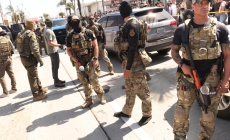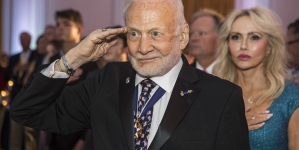-
30 hurt when car slams into crowd in Hollywood - 17 hours ago
-
Astronomer CEO Andy Byron Placed on Leave After Video at Coldplay Concert Exposes Alleged Affair - 1 day ago
-
Blood in the Streets and Death in the Air: Residents Survey Damage in Syrian City - July 17, 2025
-
Army vet calls for investigation after being detained for three days in ICE raid - July 17, 2025
-
Tariffs Push Up Prices, and the Supreme Court’s ‘Shadow Docket’ - July 16, 2025
-
ICE arrested her selling tamales at Lowes. Then she suffered a heart attack. ‘I told them: I can’t breathe’ - July 14, 2025
-
The Royal Box: Who’s in Wimbledon’s Most Exclusive Seats? - July 13, 2025
-
David Gergen, Adviser to Presidents and Political Commentator, Dies at 83 - July 12, 2025
-
Federal judge temporarily halts alleged indiscriminate immigration stops - July 12, 2025
-
Coal, the Last Survivor of Canada’s Parliament Hill Cat Colony, Dies - July 10, 2025
Russian soldier complains troops are treated like “slaves”
Two Russian soldiers serving in Ukraine spoke to a television network recently about being frustrated with their commanders and the poor conditions they’ve faced during the war.
One of the troops said they feel like “slaves” due to not knowing when their service time will end.
Current Time, a Russian-language network that’s run by Radio Free Europe/Radio Liberty in conjunction with Voice of America, posted the interviews to its website on Thursday. The identities of the soldiers were concealed for their protection. Newsweek could not independently verify the claims made in the video, and the Russian Ministry of Defense was contacted via email on Friday night for comment.
The video is just one of the many examples of Russian soldiers releasing public videos or written messages detailing their grievances in Ukraine. Individual servicemen or entire units have posted their protests on social media platforms like Telegram, and groups like the independent media project WarTranslated have shared translations into English of these communications.

Photo by JUAN BARRETO/AFP via Getty Images
One of the soldiers who spoke to Current Time was identified as Aleksandr, who was described as a military driver in Russia’s armed forces. According to Aleksandr, his role is compromised by faulty equipment, which he worries could leave himself and others in the line of fire.
He described the vehicles he operates as ” buckets [of bolts]” that “can hardly move.”
“[The commander] isn’t bothered that it will stall when the guys get in and then be targeted. Anything can happen,” Aleksandr said, according to Current Time’s translated captions.
Though he didn’t want to fight in the war, Aleksandr said, he believes he’s defending his country. However, after a year of service, he’s now having doubts.
Current Time named the other soldier interviewed as Ivan and said he’s currently fighting on the front lines in Ukraine. Though he was happy to fight at first, like Aleksandr, he’s ready to leave the battlefields behind.
“At that time [when he first went to Ukraine], I considered myself a patriot and wanted to fight for Russia,” Ivan said. “But having seen all the pluses and minuses of our army, I think the Defense Ministry has work to do.”
He added: “I came, basically, voluntarily. I could have run away, but I didn’t. Sometimes, I regret this.”
Current Time said the soldiers both complained of the harsh life they have experienced in the trenches, where they have had to deal with cold, hunger and mice.
“Many of us feel like we’re not soldiers but slaves, because there are no time limits for us—we don’t know how long we’ll be here,” Ivan said. “The longer we’re here, the less chance we’ll come home.”
Aleksandr also discussed how Russia has been recruiting convicts to fill out its military ranks, a practice that Kremlin spokesperson Dmitry Peskov defended last month by saying that these former inmates “atone with blood for crimes on the battlefield, in assault brigades, under bullets, under shells.”
Aleksandr said he and other soldiers took issue with serving with the prisoner recruits. He also criticized how convicts only serve for six-month periods in Ukraine, and then they return to Russia with their crimes pardoned.
“We were all shocked about the convicts,” Aleksandr said. “They were fighting alongside us, as equals … But they go home, while the conscripts stay and die.”
Uncommon Knowledge
Newsweek is committed to challenging conventional wisdom and finding connections in the search for common ground.
Newsweek is committed to challenging conventional wisdom and finding connections in the search for common ground.
Source link















